Ogunda Ka
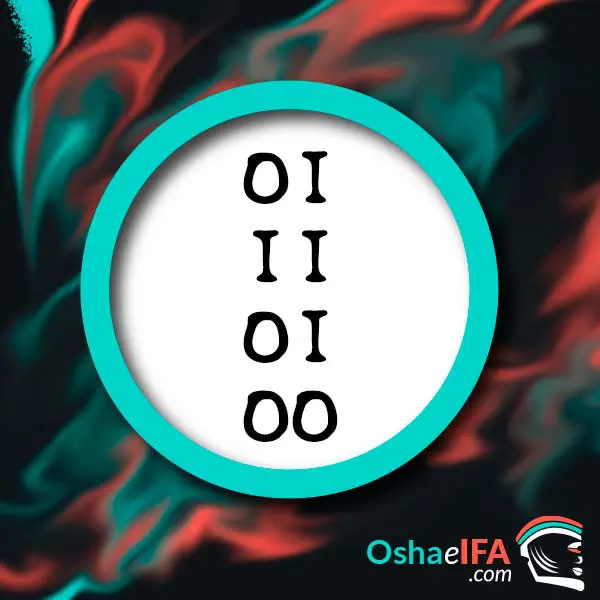
The Odu Ogunda Ka, also known as Ogunda Ika, is a sign of the Ifá divinatory system that contains profound messages and warnings for those to whom it is revealed. This sign speaks of the crucial importance of morality and honor, highlighting that it is preferable to face death rather than live dishonored and demoralized. It resonates with the principle that maintaining integrity is more valuable than any other achievement in life.
General description of the Odu of Ifa Ogunda Ika
Through his teachings, Ogunda Ika introduces us to a world where ancestral wisdom and spiritual guidelines offer guidance and protection. From the need to have Olofin to perform Ifá, to the symbolism of the elephant cemetery and the razor, this Odu unravels layers of deep meanings and warnings.
What is born in the Odu of Ifá Ogunda Ka?
- To do Ifá, it is necessary to have Olofin.
- Here, the stored waters became corrupted.
- The elephant cemetery is mentioned.
- It is the Ifá of the razor.
What does the Ogunda Ka sign talk about?
- It speaks of coercion, robbery with violence, rights violations, forced dispossession, and indecent abuse.
- Mentions disorder or crushing.
- Someone wants to move to another place.
- One person seeks to confront another.
- It is an Ifá full of doubts.
Recommendations:
- Maintain integrity: Prioritize honor and morality above all things, remembering that dignity is more important than life itself.
- Purify the environment: Perform spiritual and physical cleansing regularly to avoid illnesses and the accumulation of negative energies.
- Consult before significant changes: Before embarking on trips or making important changes such as moving, it is recommended to consult Ifá to ensure that these changes will be beneficial.
- Be careful with your health: Treat any health problem, especially headaches and leg problems, using natural and spiritual remedies.
- Strengthen spiritual connection: Perform the appropriate rituals and sacrifices to be in harmony with the Yoruba deities, especially receiving Eshu-Elegua and making paraldos on the river bank.
Prohibitions:
- Avoid moral corruption: This Odu warns against any form of corruption or moral decay, emphasizing the importance of living a righteous life.
- Don't ignore warning signs: Ignoring the spiritual warnings and advice of Ifá can lead to disastrous consequences.
- Do not drink alcoholic beverages: Alcohol consumption is prohibited, as it could lead to revealing intimate secrets that harm the individual's social life.
- Be careful when traveling: This sign recommends caution when traveling, especially if the trip involves moving permanently, as it may not be possible to return.
- Avoid impulsive actions in relationships: Warn against acting impulsively in matters of love and friendship, which could damage these important relationships.
The Ifa sign Ogunda Ka teaches us the importance of living honestly, maintaining a clean and pure environment, and closely following the teachings and warnings of Ifá to successfully navigate life's challenges.
Analysis and Interpretation of the Ogunda Ka Sign
Ogunda Ka warns us about the dangers of corruption and decay, not only in the physical sense, as in the case of stagnant waters that can cause disease, but also in the moral and spiritual realm. He reminds us of the importance of cleansing and purifying our environment, both physical and spiritual, to prevent the spread of negativity and maintain a healthy balance in our lives.
Economic Aspects
From an economic perspective, this Ifa sign suggests proceeding with caution and preparation, especially when undertaking new projects or considering significant changes such as moving or traveling. The story of the elephant graveyard, which symbolizes the return to origins at the end of life, can be interpreted as a call to consider our roots and the essence of our ambitions before moving forward.
"Salud"
In terms of health, the Ifa sign Ogunda Ka specifically mentions headaches and leg problems, recommending the use of the herb sage and ceiba leaves to alleviate these ailments. This underscores the importance of paying attention to our physical health and seeking natural and spiritual remedies to maintain our well-being.
Religious Aspects
Religiously, this Odu emphasizes the need to be in harmony with Yoruba deities such as Olofin, Oduduwa, Elegua, Shangó and Obatalá, and to perform the appropriate rituals and sacrifices to ensure their protection and blessings. The reception of Eshu Elegba and performing paraldos on the riverbank are specific practices recommended to strengthen spiritual connection and ensure balance.
Personal relationships
In the area of personal relationships, Ogunda Ka advises prudence and deep analysis before making decisions that may affect our connections with others. This Odu warns about the dangers of acting impulsively and about the importance of considering the consequences of our actions on our relationships and how they may be affected by travel or changes in environment.
You may also like: Treaty of Odun Ogunda Meyi
Sayings of the Odu of Ifa Ogunda ka:
- When the waters are corrupted disease comes.
- The elephant never dies where it is born.
- It is better to lose your life than not to lose your honor.
- When the razor cuts, justice stops.
- He who plays with candle, has to burn.
"He who plays with fire must get burned" warns us about the inevitable consequences of taking risks without caution or getting involved in dangerous situations. This saying highlights the importance of responsibility and foresight in our actions. Like fire, which can be helpful or destructive depending on how it is handled, our decisions and behaviors have the power to create positive or negative results. This proverb invites us to act with wisdom and caution, reminding us that recklessness often leads to adverse results for which we are directly responsible.
Ifa Code of Ethics of the odu Ogunda Ika:
- It is preferable to lose life and not honor it, because whoever loses honor lives the rest of his life in shame.
You may also like: Ifa Ika Ogunda sign
Meaning of the Sign of Ifa Ogunda Ka (Ika)
This Ifá warns that the person must be cautious and carefully analyze situations, since they may face enemies who are preparing traps, leading to judicial complications. It is characterized by the possibility of having numerous adversaries due to unusual behavior in dealing with others.
Furthermore, it indicates that whoever abandons his land will not return, since he will find death in the new place. This is a sign associated with travel, so it is crucial to evaluate whether it is beneficial before embarking on it.
When an Awó from Ogunda Ika receives Olofin, it is necessary to perform three paraldo rituals on the river bank to reinforce his spiritual protection, using chickens of different colors and sage. These rituals seek to prevent problems for both the practitioner and the aleyo.
This Ifá also points out the corruption of stored waters, suggesting inspecting containers at home to avoid diseases and epidemics. Leftover food should be disposed of properly so as not to attract negativity.
The person is recommended to perform purification rituals and bring offerings to the sea for three days. Ogunda Ika predicts death in a foreign land, warning about the risks of traveling without caution. This sign speaks of the inevitability of destiny, like the elephant seeking its final resting place, and emphasizes the importance of proceeding with care in all actions, especially in religious matters.
If this Ifá is revealed to a pregnant woman, rituals must be performed to protect the baby. Furthermore, the urgency of receiving Eshu-Elegba is emphasized for those under this sign, ensuring that their specific needs are understood and attended to.
In summary, Ogunda Ka reminds us of the importance of prudence, spiritual protection, and attention to divine signs to successfully navigate life's challenges.
Ifa Ogunda Ka says:
To avoid a tragedy, it is crucial that you bring the knife intended for performing an Ebó. Don't be careless, as ignoring this warning could cost you your life. For safety, he did not allow anyone to sleep in his house for seven days. There is a young woman in her home; She is careful not to commit improper acts that could lead others to want to make an attempt on her life. It is important to offer something to Egun, even if it is meat with corojo butter and cocoa butter, to seek his protection.
It is essential to receive Elegua or the warriors. There are people who will try to confront him and, without performing the Ebó, they could succeed, causing an encounter that, without seeking it or being aggressive, will involve him in legal problems. This incident could occur on any given day during a walk, resulting in an injury; Also, pay attention to your child to prevent him from being injured in a fight.
Do not ignore these warnings, as death could occur within seven days. There is a risk of a family death; even its morality is questioned. Be cautious with fire and avoid consuming stored water to avoid getting sick. Someone in your home wants to leave and not return. It is vital not to lose your honor or your dignity, both in your religious environment and before Olodumare and the saints. The Babalawo must consult what specific actions to take, since the risk of death is imminent.
Prayer of the Odu Baba Ogunda Ka:
OGUNDA KALARE ODAFA ABE EYELE LEBO. MARUBA INTORI IYA OGUNDA
KA KAN ADOFA LANLE ADIFAFUN ABO KAFEREFUN OGUN.
Suyere Oddún Ogunda Ika:
OGUNDA KA KAKA LORUN
OGUNDA KA KAKA LAIYE IRE AYE
OGUNDA KA KAKA LAIYE LAYE BEYIGUE
OGUNDA KA OSANYIN OBI BAWA BABA LORUN
You may also like: Ifa Ogbe Ogunda sign
Ebbo of Odu Ogunda Ika in Ifá:
When this Odu (Ogunda Ika) is revealed in a consultation:
Three oshinshin will be prepared every three days, which will be taken to the sea.
To Eshu-Elegba: If it has not yet been received, it is imperative to do so. For those who already own it, it is crucial to ask what specific actions or offerings you want.
In relation to Ogun: Ogún will be offered beef, spread in corojo butter and cocoa butter, to avoid problems for the consultant.
Baths: Baths will be made with sage leaves.
To offer to Eggun:
- When offering to Egun, Ogunda Ika will be placed, the corresponding animal will be offered, covered with sage and then a dove will be offered.
- You will need a rooster, three dry coconuts, a green water coconut, two additional roosters, hutía and smoked fish, roasted corn and a considerable sum of money.
Note: A rooster will be for Eshu-Elegua and the fate of the other two will be consulted.
Patakies (Stories) of the Ifa sign Ogunda Ka:
Ayanaku's Tomb:
In this story, Orishaoko faces a great challenge to extend the mainland beyond Ile Ife and, seeking a solution, consults Inle Oguere through Ifá. The Oracle reveals the need to use Layimbo, a deer given by Olofin to Oshun, to speed up travel around the world. Thanks to the magic of Agbani, who consumed eruba (elephant grass) next to the river, the land of Ile Ife is solidified. Obatala, impressed, decides to honor the deer and offers Agbani an inshé to transform him into a great being. However, Agbani rejects the gift and walks away, losing the opportunity to become an elephant.
Some time later, Orunmila's children fall ill, and Eri Oke is summoned. Orunmila, through the Osode, discovers that it is necessary to search for Ayana, guardian of the secrets of life, who resides in the center of the Earth. Eri Oke, on her mission, fights and defeats Ayana, securing the secret of life for Ile Ife. For this feat, Oduduwa baptizes him Laye, "the owner of the world", and he is known as Ayanaku, "the one who killed Ayana and saved Ile Ife."
Explanation: The story of "The Tomb of Ayanaku" symbolizes the ceaseless search for wisdom and the sacrifice necessary for the preservation of life. Through the characters of Agbani and Eri Oke, we are taught that arrogance and rejection of help can lead us to miss significant opportunities for growth and transformation. While courage, determination and acceptance of destiny can lead us to perform great feats for the benefit of all.
The narrative also reflects the importance of humility and willingness to accept the gifts and responsibilities given to us. Ayanaku, by assuming the responsibility of fighting for the secrets of life, becomes a legendary figure who ensures the continuity of existence in Ile Ife.
This myth reminds us that, in the cycle of life, we will face challenges that will require sacrifice and courage from us. How we respond to these challenges will define our legacy and the impact we will have on the world and those around us.
When Oduduwa gave Awó Abaye power and luck.
In the land of Ikaniye, lived Awó Abeyeni Ifá, a wise man of great powers who always wore his head covered with sage. Despite his greatness, he cared for his son, Omo Ifá Abaye, born in the land of Ikabaye, dominated by Oduduwa. Abaye's mother, Iya Orun, disbelieved in Oduduwa and constantly cursed him, although paradoxically, these curses benefited Abaye thanks to Oduduwa's great power.
Oduduwa, seeking to help, arrived at Ikabaye and covered Awó Abeyeni Ifá with sage, cleansing and blessing him. After performing several rituals, Oduduwa promised Abaye that despite the hardships he would face, he would be lucky until he reached the land of Baba Niregun. There, Osanyin and Elegba would grant him great powers. Following his instructions, Abaye received the blessing of these deities and was promised consecration alongside Shango and Oshosi.
In his quest for Abaye's peace of mind, it became evident that Oduduwa's presence was essential. Shango and Elegba, knowing that Oduduwa was sick, performed rituals to heal him. Once recovered, Oduduwa promised to bless and grant luck and power to Abaye.
Explanation: The story highlights the importance of faith, community, and the power of blessings in overcoming adversity. Through the union and joint efforts of various deities and sages, balance is restored and a prosperous future is ensured for Abaye. This story teaches that, despite the curses or difficulties we may face, divine intervention and mutual help can transform negativities into blessings.
Furthermore, it highlights that respect and veneration towards deities and elders are essential for harmony and success in life. The consecration and reception of Oduduwa as part of the spiritual path of the Awó indicates the need to recognize and accept the guidance and protection of greater forces for personal and spiritual progress.
In essence, "The Tomb of Ayanaku" reminds us that we are not alone in our struggles and that community support, along with faith in the divine, are fundamental pillars to achieve prosperity and inner peace.
You may also like: All about the Orisha Shango
Ogunda Ka Ifa Traditional Nigerian
ÒGUNDÁ ÌKÁ
Ìrè níí yèdí òpè
A day fún Aríyùnkésé Obìnrin Òrúnmìlà
Ekún omo ni n sun
Aríyùnkésé Obìnrin Òrúnmìlà ní n fojúú sògbérè omo
Wón ní ó rbo
Wón ní wón or tojú emo iyán
Wón bá fi emo iyán se Ifá fun un
ó bá bí omo
Ngbà or said kefà
Wón pé jo kí wón ó we are lóóko
Wón bá ní boo lomo or ti moo je
Ifá ni emo iyán la fi se Ifá fun un
Tee bímo
Ifá ní e móo pe omo náà ní Elémo n teyán
Won we are ni Elémo n teyán
Obiin tún ko
Kò tún róyún ní
Wón ní kí won ó lòó bo Òkò
won bo oko
Wón tún bímo náà tán
Ó tún said kefà
Won ó so omo lóóko
Wón ni bóo làwón or ti so eléyìí?
Ifá ni e móo pè é ní Abìdí òkò yambarì
oh tun pé
Won ò tún tètè róyún ní
Wón to Ifá
Wón tún bèère ohun ebo
Ó ní kí wón ó tojú òpòlopò emu
Wón tojú emu
Wón bá se Ifá fun won
Ngbà tí wón or tùún bí
Okùnrin tún ni
Níjó kefà tí wón or tùún somo lórúko
Omo eléyìí or ti móo he?
Wón ní ó móo jé Jàngbórúnkún abinú emu jìírìnkinkin
Omó bá n jé Jàngbórúnkún abinú emu jìírìnkinkin
Àwon omo wònyí wáá dàgbà
Isé Awo sì ni won n se
Won bá pa Awo pò
Wón sawo you
Wón re ilé Alájé finfín Ilé àdó
oh ke won
Wón mu sarágede
Ngbà tí ón kúò nílé Alájé finfín Ilé àdó
Wón re ilée Kònkò omo àmuyè
Òun náà ké won
Wón tún sawo títíí you
Wón relay Oníràwò àgbà
Wón sì ti pé kí wón ó rboó lè de àwon omo wònyi
'Ngbà tí wón ó bàá di olórò léyìn òla'
'Kí Elénìní ó mó baà dá won lónà'
'Ilé Oníràwò àgbà tí ón sì n lo yìí
Tí on bá e mú olàa tibè
Won ò tún tosí mó laí
Ngbà tí wón or dèé ilé Oníràwò àgbà
Erú Oníràwò àgbà bá bó Síwájú
Kò jé kí won ó rónà dé odo Oníràwò àgbà
Oníràwò àgbà n pé fi on Sílè
'Jé kí wón ó wá'
ó ní rárá o
Bí wón or bàá wo inú Ilé yìí sùn
Tí wón or yes sawo nnú Ilé yìí
Àyàfi bí ón bá le mo òun méta tín be nnú igbá yìí ni
Oníràwo àgbà bá lòó mú iyán
Ó fi sinú igbá kan
Ó mú èedú iná
Ó fi sinú igbá kejì
ó yes mú òkò
Ó fi sínú igbá kan tú kù
Wón bá ní n ti n be nnú igbá yìí
Béyin métèètá bá le mò ó
Read them
Tea bá mò ó
Owo yin tea
Elémo n teyán ló kókó bóó wájú
Ó ní táwon ò bá fi níí mo nnkan tí n be nínú igbá ìí
'Elémo ní ó yà teyán'
Wón ní wonó gbé igbá iyán kúò nbè
Àwon èèyàn lóò wo erú Oníràwò Àgbà lójú
Wón ni Awo gidi ni àwon omo yìí
Eléèkejì ní ti àwon ò bá fi níí mo nnkan tí n be nínú igbá yìí
Ó ni 'Iná jó dóríi kókó nùu'
Èédú iná tú sì jó
Ni ón n pè ni kókó
Òun ni ón kó Sínú Igbá
Wón ní wón or gbé òun náà séyìn
Ngbà or kan èèketa
Ìyuun ní 'Ení ó ju òkò níí rófiiri òkò'
Wón ní wón or gbé métèèta
Oníràwò àgbà lóun ò wí fún or ìwo erú
'Tóo lóó dàá on lónà'
'Àwon omo tí ón ti rubo fún'
Ayé ye won
Neither wón wá n jó nor wón n yò
Wón n yin àwon Babaláwo
Àwon Babaláwo n yin Ifá
Ó ni béè làwon Babaláwo tòún wí
Ìrè níí yèdí òpè
A day fún Aríyùnkésé Obìnrin Òrúnmìlà
Ebo n won ni or se
Ngbà you or bìí
Ó bí Elémo n teyán
Ó bì abìdí òkò yambarì
Ó bí Jàngbórúnkún abinú emu jìíìrìnkinkin
Wón sawo marmoset
Wón relay Alájé fínfín Ilé ìdó
Won wobè
Wón mu sarágede
Won ki won
Won ke won
Wón lo si ti Kònkò omo àmuyè
Wón rebè, wón mu sarágede
Won ki won
Won ke won
Wón wáá de Ilé Oníràwò Àgbà
Erú Oníràwò àgbà wáá tìlèkùn olà pin pììn pin
Wón ti pé kí wón ó rubo
Kí wón or toó bí won kí wón or too móo lòó sawo
Kí won or mó le tìlèkùn olà mó won
Wón gbébo nbè wón rubo
Awó mòmò kóre de tùtúru
Àwa omo Ìrè níí yèdí òpè
A mòmò kòre de tùtúru.
Ifá wants this person to be well. Life will please you; he will have tranquility and peace. Ifá sees three children for this person. All three children will be very successful in the career of their choice.
Ìrè níí yèdí òpè
He made divination for Aríyùnkésé, the wife of Òrúnmìlà
She was crying because she had no children
It was Aríyùnkésé, Òrúnmìlà's wife who was crying because she had no son
They advised him to make sacrifice
They told him to prepare the seeds found in the beaten yam
They used it to prepare an Ifá potion for her
She got pregnant and had a child
On the sixth day
They came together to give the boy a name
They asked the father what the name would be
Ifá said 'We use the seeds found in the crushed yam to prepare a portion of Ifá for her'
'Before she could have the baby'
'Name the child Elémo n teyán'
They named the boy Elémo n teyán
After weaning the first baby; the woman was still finding it difficult to get pregnant again
They advised them to offer sacrifice to Òkò
They offered the sacrifice to Òkò
They had another baby
On the sixth day as usual
They got together to give the boy the name
They asked Òrúnmìlà again 'What name will be given to this one'?
Call it 'Abìdí òkò yàmbarì'
They named him the Abìdí òkò yambarì
After a while
The woman could not get pregnant the third time
They consulted Ifá again
For the third time in a row, they advised him to sacrifice
Ifá had said 'Prepare enough palm wine'
They prepared the palm wine
The Babaláwo used it to prepare a portion of Ifá for her
She had another baby
He was a male child like the first two
On the sixth day of the naming ceremony
They asked 'What was it to be called'?
'Call it Jàngbórúnkún abinú emu jìírìnkinkin'
The boy was named
These children began to grow
They were training like Babaláwos
They combined their priesthood
And they practiced the priesthood together
They went to the house of Alájé finfín in the city of Ìdó
He took good care of them
They drank the wine of sarágede
They left the house of Alájé finfín in the city of Ìdó
And they left for the house of Kònkò omo àmuyè
He also took care of them
They practiced and practiced their priesthood
They arrived at the house of Oníràwò Àgbà
So they were advised to offer sacrifice before the arrival of these boys
'In case they got rich later in life'
'So his detractors don't destroy him'
But to the house of Oníràwò Àgbà to which they are entering
They must be lucky enough to capture the wealth there
Since they will never live to know poverty again
When they arrived at the house of Oníràwò Àgbà
Oníràwò Àgbà's main slave blocked his way
He prohibited them from entering to see Oníràwò Àgbà
Oníràwò Àgbà told him to allow them to enter
Oníràwò Àgbà said 'Let them come to me'
The main slave said 'No way'
'If they are going to sleep in this house'
'And to practice his priesthood under this roof'
'They must be ready to solve the riddle of what those pumpkins contain'
Oníràwò Àgbà took out the crushed yam then
He placed it in a
Charcoal
He placed it in the second
He found a stone
And placed it in the last pumpkin
The main slave said: 'Look at these three vessels'
'If you are successful in telling us what is inside the pumpkins'
'We will let it go'
On the contrary
'You will be sentenced'
Elémo n teyán first walked forward and said:
'For us who do not know the volumes of those pumpkins'
'The yam masher could have mashed his yam better'
They asked the slave to move the first pumpkin aside
People saw the eyes of the main slave
They murmured saying: 'These boys are true priests'
The second said 'For us who do not know the content of these pumpkins'
'The wood may have been burned hard and dry'
So is the coal that was left unburned
What is known as kókó
It's this kind of charcoal that's in the pumpkin
They told him to uncover the second pumpkin
It was the turn of the third
He approached and said 'He Who throws a stone will see the path of the stone'
They also said to move the third pumpkin
Oníràwò Àgbà told his main slave 'I didn't tell you'
'When you didn't let them in'
'They are children whose sacrifice had been offered before their birth'
Life pleased them that way '
They began to dance and rejoice
They were praising their Babaláwo
His Babaláwo was praising Ifá
They sang in chorus 'It was as our Babaláwo predicted'
Ìrè níí yèdí òpè
He made divination for Aríyùnkésé, the wife of Òrúnmìlà
They advised her to sacrifice so that she could have children
When she was going to have her children
She had Elémo n teyán
She had Abìdì òkò yambarì
She had Jàngbórúnkún abinú emu jìíìrìnkinkin
They practiced their priesthood
He arrived at the house of Alájé finfín in the city of Ìdó
They entered his house
They drank and drank the wine of Sarágede
Alájé finfín I greet you
And took care of them
They went to the house of Kònkò omo àmuyè
They got there and drank the Sarágede wine
Kònkò omo àmuyè I greet you
They now arrived at the house of Oníràwò Àgbà
Oníràwò Àgbà's main slave closed the door firmly on them
Ifá had asked the priest to perform sacrifice
Before they were born and began to practice their priesthood
So that no one would close the door of their good fortunes
They heard about the sacrifice and performed it
We have brought the good fortunes
We, the children of Ìrè níí yèdí òpè
We have brought good fortunes.
Discover the Paths of Elegua: The different facets of the Orisha of Destiny
Eshu of Ogunda Ika: Laroye
For the preparation of Eshu Laroye, an otá (stone) selected from a corner is required, symbolizing the crossing of paths and life decisions. This Eshu is nourished by elements that represent life, death, renewal and communication between the divine and the earthly. The ingredients include ekú (dried meat), ejá (dried fish), corojo butter (palm oil), awadó (corn), ataré (Guinea pepper), honey and coconut, used to check if the otá belongs to Laroye. The affirmation is celebrated with the offer of these ingredients and an osiadié (chicken).
The creation of this Eshu is enriched with an afoshé composed of 21 types of wood (igí) and seven roots, various herbs (ewé), seven branches of pica pica (stinging plant), 21 ataré, 21 grains of awadó, earth of a bibijagua cave (type of ant), gbogbo ileké (all beads), Shango and Orunmila beads (deities of the Yoruba religion), church ground, cemetery, four corners, sea, malú jar powder (buffalo horn ), lerí from akukó (rooster's head), lerí and elese from ayapa (jicotea head and legs), shells from eñi adié (chicken egg) and eyelé (pigeon egg) removed, three dilogunes (snails), erú , obi, kolá, esun (shell), land of elese oke (mountain), and lerí gunugun (bird skull).
These components are not random; Each one carries a deep meaning and a specific purpose, from connection with ancestors to protection, divination and healing. Eshu Laroye thus becomes a powerful guardian and mediator, capable of opening and closing paths, offering clarity and protection to those who honor him correctly.
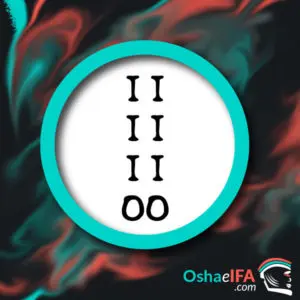


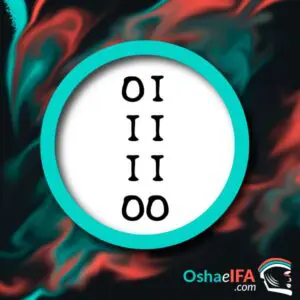
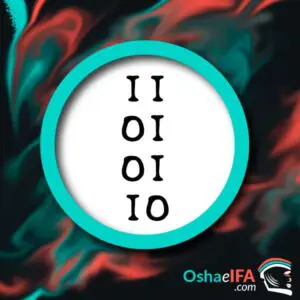
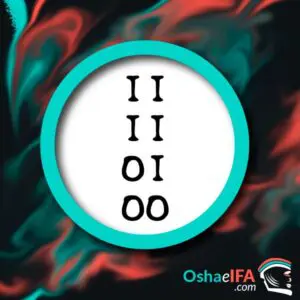
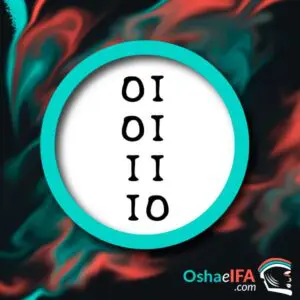


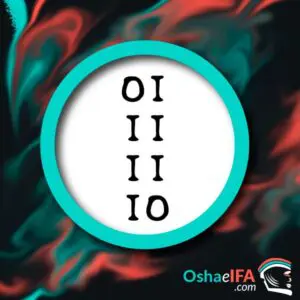
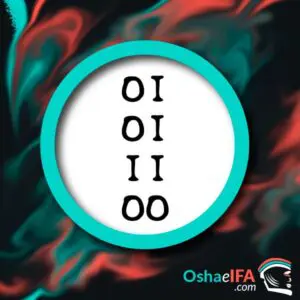


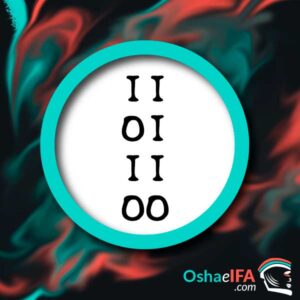
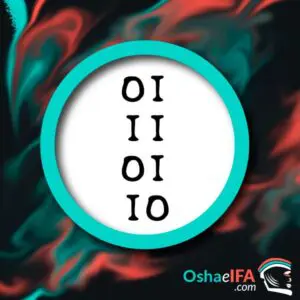
Ogunda Ika is my odu